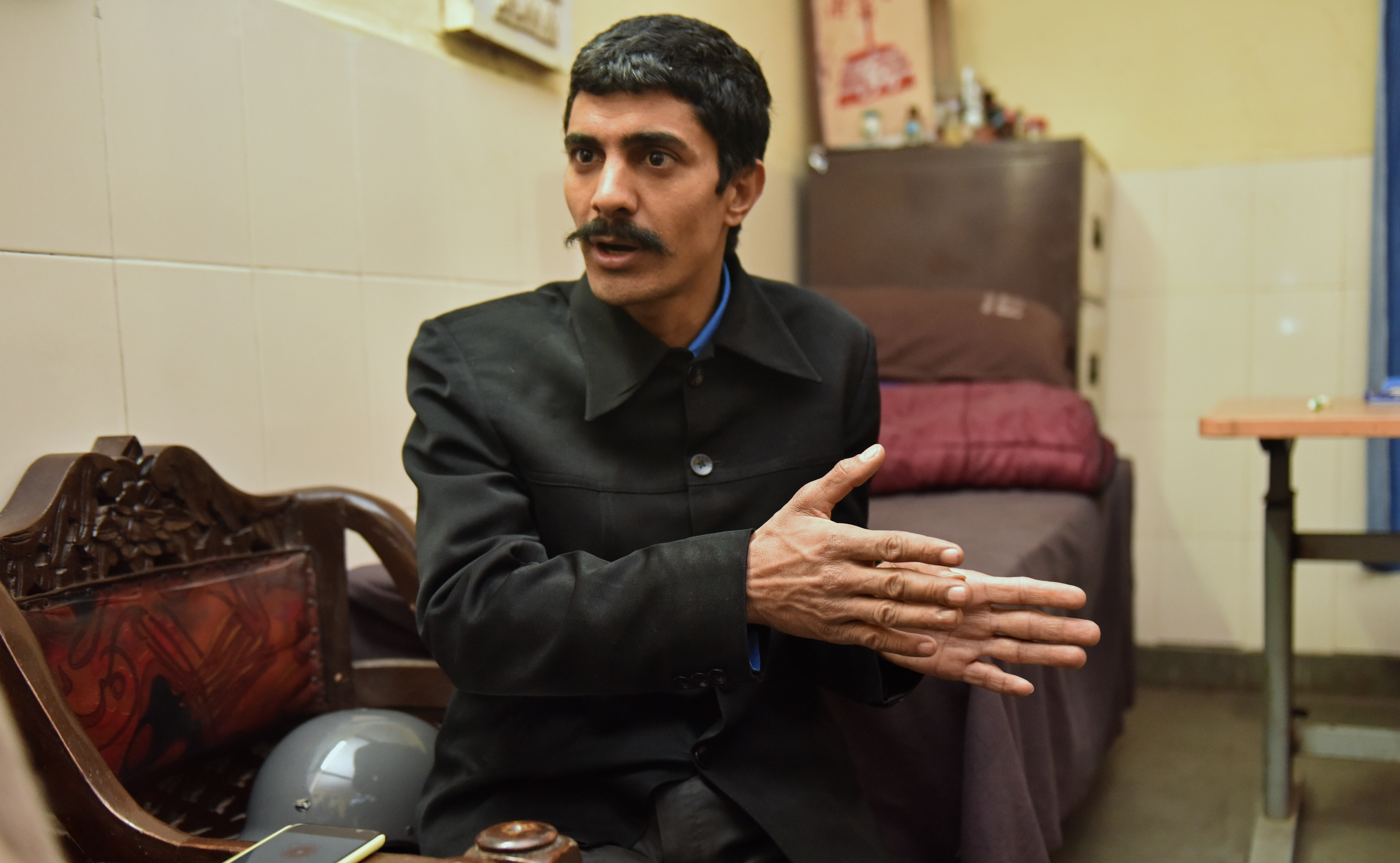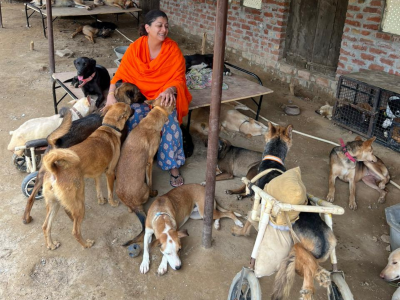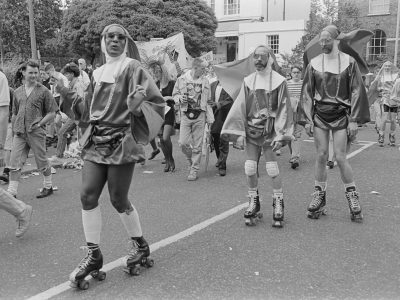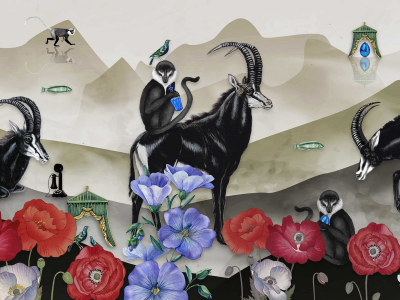A man who lost everything and became homeless overnight is now rescuing people from the streets and helping them lead a better life, along with his team of 48
At 9:30 every night, Vickey Sharma, 29, with his team of four persons, in a grey Maruti Suzuki Eeco packed with some thick blankets, drives to different corners of Old Delhi to rescue homeless people.
Every night, the team, which Sharma calls the ‘volunteer team’, rescues about 65-70 people. Some are drunkards, some lost and some are looking for a shelter in the harsh winter of Delhi.
It seems like a well-planned routine, something you would want to do to fulfil your societal duties. However, for Sharma, this comes naturally as a result of the empathy that he was shown years ago.
Born in the Doda district in Jammu and Kashmir, Sharma had completed his Bachelor’s degree and wanted to pursue a master’s degree too, but due to the stringency which runs deep in his family, he was tired of his life.
One day, he decided to run away from home. He knew a person working in the Prime Minister’s office. Sharma contacted him for a job in the Capital. He thought he’d continue his studies here whilst doing a job.
Little did he know that his life will turn grim in a snap.
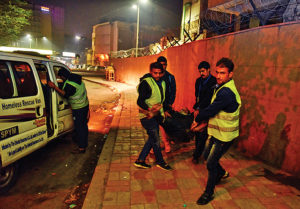
The story goes back to 2013, when Sharma took a train from Jammu for Delhi. He reached New Delhi Railway Station and was excited to be in the city. He had an appointment at PMO in the afternoon and all was supposed to go well.
While he was playing a game on his mobile phone, the Internet plan stopped working, he met a man who asked him if that was his first visit to the Capital.
When Sharma answered in the affirmative, he suggested that they could go around and see all the beautiful places in the city.
“I was excited since I hadn’t seen the city before. That man said that he would show me a very beautiful place and took me to Gurudwara Bangla Sahib. Sharma wanted to freshen up and asked the man to take him to a hotel.
But the man suggested that he can use the bathing area in the gurudwara. “I kept all my belongings in a bag and went to take a bath. It was a small room and I forgot to lock the door,” Sharma says.
On returning, he found that the man and his bag were nowhere to be seen. The bag had all his certificates, identity cards and money. Sharma was just in his shorts. He escaped the gurudwara premises, but people mistook him for a mad person.
He knew nobody in the city, he had lost his phone and with it, the contact of the person he was supposed to meet. He was left with nothing but the shorts he was wearing. “The next day I found some shirts in a dustbin,” tells Sharma. “Now I had to find clothes to cover the rest of my body,” he added.
He tried returning to the gurudwara complex, but some people turned him away as he did not look respectable.
Since he had nowhere to go after this incident, he started sleeping near Patel Chowk Metro Station.
Later he filed an FIR. But it didn’t prove to be of much help.
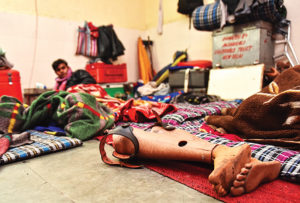
Photo: Naresh Sharma
“I told myself that you’ve cried enough. Now look for some work,” he says. He went to a factory, but the owner did not employ him because he did not have any identification proof. “Also, since I am from J&K, they were a little hesitant,” adds Sharma.
As he was walking away, however the owner called him back. He nodded. “I desperately wanted money to eat. The task was to carry 400 bricks to the second floor,” he says. He completed the task and the owner gave him money, along with food packed in a polythene.
After this, he did irregular work and started earning Rs 300 per day. One night he saw a man giving blankets to people. “I was curious to know. I had seen him and his people before and I used to think they’re mad,” says Sharma.
He approached them, and told them his story. They were so touched that they decided to help him with his documentation and also with getting him a job.
“Mujhe pata chala kuch bhi ho jaaye, neki bahut badi hoti hain (I got to know that no matter what happens, there still are good hearted people in this world),” says Sharma as he gets teary-eyed.
He got to know about the rain baseras (shelter homes) in the Capital and started staying in one in Old Delhi.
With the help of the NGO, he got a job in SPYM (Society for Promotion of Youth Masses) where he used to get Rs 10,000 as salary. But he had something else in his mind.
“I decided that I will use all the money that I earn to help people like me — who have nowhere to go,” Sharma says.
One night he met an Iranian family of three, while he was doing his duty as the caretaker. The case sounded familiar to him — a lot like what he had faced. They were in India on a tourist visa, which expired five months ago.
They were left with no money, and nowhere to go. “They also hadn’t eaten for five days. At first, I thought they may be terrorists but after getting to know the entire case, I vacated a room for them,” he says.
He not only gave them shelter, but also went to the Foreigners Regional Registration Office. “They told me that the family has no documents and written proof is required from all the places they visited during these five months,” says Sharma, adding, “Who will give proof of them staying on footpaths?”
Then he called up the same NGO, they approached the court and got an order that the family should be sent to Iran. Before this, several security checks were conducted.
However, a substantial amount of money was required for the visa, tickets and for the family to survive.
Sharma, through his network of homeless people, raised about Rs 6 lakh and put all his savings — amounting to Rs 5 lakh — to send the family back to Iran safely.
Amidst all this, a man from the family got severely ill. Sharma admitted him to Khadija National Hospital where the per day cost, as he says, was Rs 10,000-12,000.
For this, Sharma ended up spending all the money that he had saved, but he was more than happy to help. “In my mind there was one thing — if one person has helped you, you should help ten more people,” says Sharma.
The daughter and the mother were soon sent to Iran. Since the husband was still recovering, Sharma decided to accompany him to Iran. He already had his passport made with the help of the NGO.
He has helped several other people, who remind him of the plight he had to suffer when he came to the city.
Sharma also reveals that he met the person from the PMO (who he was supposed to meet when he came to Delhi), but life has changed so much for him that he cannot go back to his earlier state of mind. He’s currently pursuing Masters in Political Science, but gets little time to study. He aspires to help more people and concludes, “Thoda samaaj seva karenge toh kya jaaega? (What will we lose if we do some social work?)”
Rescue work
Sharma knew a person who used to carry out rescue efforts, but on a very small scale. Once when he helped a person from his shelter in buying an e-rikshaw that person offered him help in return.
Sharma asked him if he could use his e-rikshaw at night to rescue people. Instantly, the man agreed. Gradually, he convinced other people to bring their e-rikshaws, so that rescue work can be done every night.
After some time, Sharma was handling a fleet of 22 e-rikshaws as part of his rescue efforts for homeless people.
He tells that every night they go to different areas like Chandni Chowk, GB Road and Minto Road to rescue homeless people who are facing the harsh cold.
He doesn’t force them, but politely asks if they want to go to a shelter. “If there’s someone in need of food or hospitalisation, we do that too,” says Sharma.
In case of people who are under the influnece of alcohol or drugs, he doesn’t ask them to come, but provides a blanket as help. His team also tries to convince these people to visit a Nasha Mukti Kendra (Rehab centre for alcoholics).
Today, he has a van, which has been provided by his workplace, SPYM. He gets money for CNG, while he takes care of the petrol.
With a team of 48 homeless people, he executes rescue operations every single night of the week. No breaks. He says that he doesn’t seek help from other NGOs, as “not all are doing the right kind of work.”

